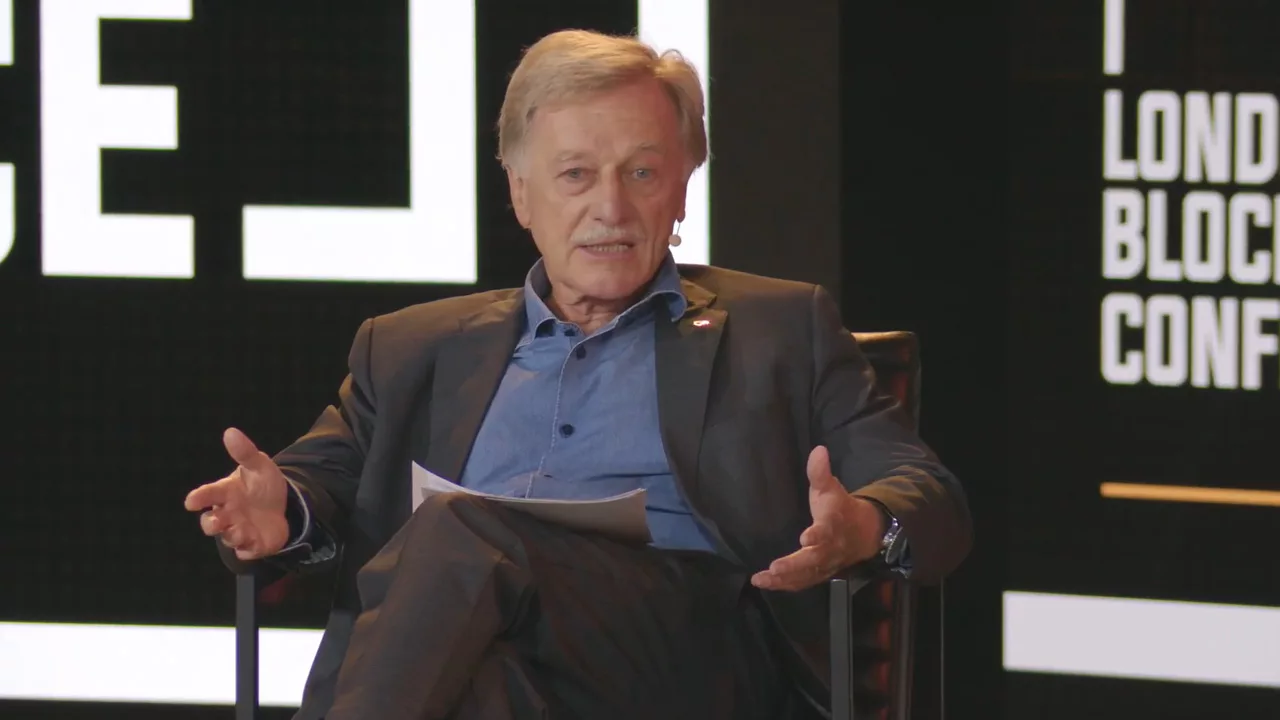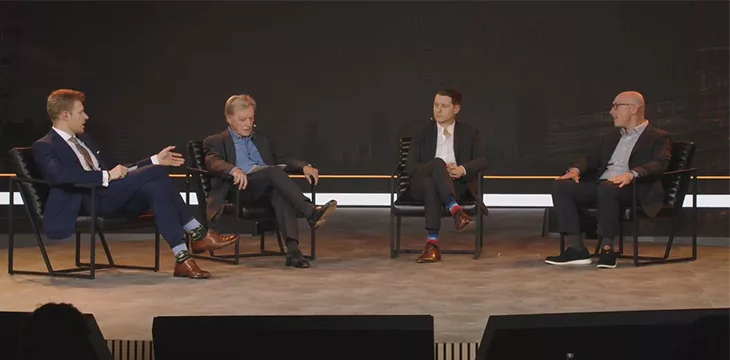|
Getting your Trinity Audio player ready...
|
To fans of Ben McKenzie’s acting work, seeing him on stage with Yves Mersch might have felt a little surreal. Mersch, the former executive board member at the European Central Bank (ECB) and the former governor of the Central Bank of Luxembourg, had just finished delivering a keynote on the digital asset regulatory frameworks being developed in Europe.
But McKenzie is also an economist and has just written a book taking bites out of the digital asset industry and its penchant for fraud and scams called “Easy Money: Cryptocurrency, Casino Capitalism, and the Golden Age of Fraud.” That’s why he joined Mersch and BSV Blockchain Association’s global public policy director Bryan Daugherty for a panel discussion on “It’s Time for Regulation to Enable the Growth of Blockchain and Digital Currency,” moderated by BSV Blockchain Association executive committee member Marcin Zarakowski.
“I like to joke it’s about money and lying,” McKenzie said of the book. He knows about the money—he has a degree in economics—and as for the lying, he said, “I’m an actor. I do it for money.”
For McKenzie, he said most “cryptocurrencies” fit the textbook definition of a security.

“You put money into them, and you expect to make money from them without work. That’s an investment contract for me,” he noted.
Moderator Zarakowski asked Mersch about his observations at the heart of the European financial world during his tenure.
“Innovation has to be viewed positively. That’s the first start. Second, we are in a functioning market economy where you should support innovation because it brings welfare and productivity increases to our societies,” Mersch answered.
“Disruptive change is one of the elements which make the market economy superior to a centralized planned economy. But change also offers opportunity to circumvent rules, to have illicit activities. That’s where the less positive part of innovation has to be circumscribed,” he added.
Zarakowksi also asked Mersch about his thoughts on the digital Euro and similar CBDC proposals. He said that much of the loudest voices in support of digital assets in the early days were coming from the same corner that doubted whether the Euro could be a viable project.
“We have a mandate to defend monetary sovereignty in our region. That’s why we said okay, we need [to be] certain about regulation to have this innovation be in organized patterns. But we also will maintain the public money as the anchor of the public system. Especially in the European area where the economy is financed to 70% by the banking system as opposed to other jurisdictions where it is only half so,” he stated. “But central banks need to be prepared when people are asking for it—not in another seven years.”
In Mersch’s keynote kicking off the second day of the conference, he canvassed the wave of regulatory frameworks being developed worldwide, particularly Europe’s MiCA regulation, which was just passed today. But what exactly is the imperative sitting behind this new wave?
“[Cryptocurrencies] are often preying on those that are less fortunate. I think that’s one of the biggest concerns,” Daugherty chimed in. “Then, I’ve started to notice people are understanding the conflict of interest that occurs. Think of FTX—you’re creating a token, putting the value on it, and exchanging it. There’s a serious conflict of interest there.”

Daugherty highlights the FTX case as an example of regulation failing and succeeding at protecting investors from predatory actors in the industry. On the one hand, FTX had tried—and failed—to obtain a New York BitLicense, which Daugherty sees as a high watermark for licensing regimes globally. This kept FTX out of New York, but it didn’t ultimately stop the Sam Bankman-Fried empire from courting lawmakers and growing enough of a presence in the industry to cause a near-meltdown when it finally collapsed.
As for the state of play in the U.S., McKenzie references the imperfect division of labor between the SEC and the CFTC, saying that this invites hard distinctions between asset classes and their regulatory regimes, which may not easily be applied to digital assets.
“This creates perverse incentives, in my opinion,” he said. “First of all, there’s a gray area: what’s going to be classified as a commodity or a security? Bitcoin’s classification as a commodity was somewhat random—there was a futures contract; therefore, it can be classified as a commodity. It created a gray area where a lot of companies felt they could come in, issue their coins, and commit what looks like fraud.”
Zarakowski asks Mersch for his view on the incoming European digital asset framework, MiCA. Does it go far enough?
“There’s certainly always something missing. It’s not comprehensive. It’s acknowledging there are gaps to be filled. As I said myself, some future legislation on [distributed ledger technology] will be coming in, and even in the different opinions of different agencies, it was mentioned there are still gaps…NFTs are not covered by this legislation. There are daily new innovations and new investments coming up. So it’s not meant to be comprehensive.”

Echoing this sentiment, Daugherty said that regulation alone isn’t enough. What’s needed is education—and this shouldn’t be pre-empted by the promised utility offered by blockchain technologies.
“While we are in desperate need of this utility today, I don’t feel as if the education and understanding of what the value proposition that was brought forth by Satoshi as far as this fusion of data and finance and what this applied to and removing this heavy reliance on trusted third parties and providing a way to monetize something on the internet without relying on them,” he explained.
“I’ve done work with the NY state attorney’s office on the crypto bill, where I feel that empowers even more fines and regulatory oversight that’s required. There’s a huge misunderstanding of these technologies and the purpose of these technologies. It starts with the definitions of these terms and the implications of what this technology can do,” he added.
Daugherty also said one area where the European Union is making the right moves in this area is that they are “very open to having these conversations and kick the tires on these technologies in order to understand them.”
“I love the idea of the EU sandbox. Ultimately, to bring this to the forefront, we need compliance, so governments and businesses feel safe to bring these technologies and use them,” he remarked.
However, McKenzie and Daugherty were both keen to emphasize that the legal system already has many of the answers to the digital asset question. For example, the U.S. securities regime already has a mechanism for determining whether a new type of offering amounts to a securities offering, and that mechanism has been successfully used to classify digital assets.

As for the prospect of whether the industry could be left to self-regulate, the panel had mixed views:
“I’m very surprised this is something that is not widespread n the crypto world because it helps official regulation,” said Mersch. “It does not replace it. But even official regulating and supervision do not prevent crisis…But if there is not an element of self-regulation inside the industry, I think there will always be a tendency of over regulation, and then there will not be a cooperative stance.”
Daugherty and McKenzie were less optimistic that the industry could ever be relied on the self-regulate. McKenzie, who interviewed Sam Bankman-Fried when researching his book before the FTX name became a dirty one in the industry, quipped: “I’m the father of three small children… I’m skeptical of self-regulation. Let’s put it that way.”
To illustrate, he asked about exchanges like FTX: “Why were they set up through shelf companies in the Caribbean? Was it because innovation was stifled domestically, or was it that they were trying to get away with something?”
Watch: Crypto regulation will make life easier for BSV

 02-18-2026
02-18-2026 




